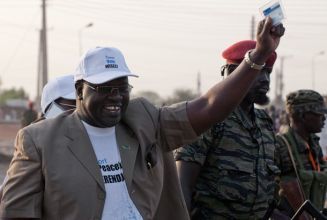South Sudan has political ‘roadmap’ for post-referendum governance – Machar
January 20, 2011 (JUBA) – Riek Machar, the Vice President of the emerging new independent state of South Sudan said the region has already prepared a “roadmap” for post-referendum governance, dismissing fears of political instability after independence.

Preliminary results have so far indicated the overwhelming vote in favour of secession, which will lead to declaration of independence in July after confirmation by the referendum commission of final results in February.
However, general fears are being expressed about what the political situation of the new state will be after it gains independence. Some observers call it a failed state in waiting that will be marred by political instability and ethnic tensions. Currently, the SPLM is the ruling party and there are dozens of other political parties in active opposition.
In a meeting in Juba with a UN delegation led by the chairman of the UN Panel to Sudan and former President of Tanzania, Benjamin Mkapa, Machar explaiend that the South would emerge politically stable. He said the region has already prepared and was committed to a post-referendum governance roadmap.
Machar equally assured the top Chinese diplomat in Juba, Zhu Zhibin, on 20 January of the future stability of the South. Last week the leader of the United Democratic Front (UDF), Peter A. Sule, in his BBC interview revealed what he called ethnic domination in the present government and marginalization of some other political parties.
The Vice President said that the region would immediately begin to implement the resolutions and recommendations of the roadmap after declaration of the final results of the referendum, in order to avoid such political tensions.
In in October 2010, all the South Sudanese political parties held a conference in the regional capital, Juba, UDF included, and agreed on the roadmap to guide the future governance of the region after the referendum.
The roadmap stipulates that a constitutional review conference will be conducted after the referendum and will agree on the specifics of the formation of a new transitional broad-based government by 9 July 2011 under the leadership of the current President, Salva Kiir Mayardit:
“An all-party constitutional conference shall be convened, in the event of secession, to deliberate and adopt a new constitutional system of a new independent and sovereign state.
The constitutional conference shall discuss and agree on the formation of interim broad based transitional government under the President of the Government of Southern Sudan, Salva Kiir after the end of the interim period.
The transitional government shall be charged, inter alia, with the duty to conduct the population census and general elections for a constituent assembly that shall
promulgate the current constitution.
The constitutional conference shall decide on the length of the interim period, necessary to carry out general elections for constituent assembly.
In order to ensure effective implementation of the conference resolutions, a Leadership Consultative Forum was formed under the GoSS President with membership of all the chairpersons and representatives of all the political parties and tasked with the follow up and implementation of the resolutions.”
Machar assured the convened that the implementation of the roadmap will further stabilize the political atmosphere among the political parties in the region. He further added that the new independent entity will create a stable heterogeneous country out of all ethnic groups.
However, he said he was concerned about the future of the Sudan Peoples’ Liberation Movement (SPLM) in the north of Sudan if South Sudan gains independence; the ruling party in the north, the National Congress Party (NCP) have indicated their refusal to allow the SPLM Northern Sector to exist in its current form after the South breaks away. NCP also operates in the south but many of their senior members have recently defected and joined either the SPLM or other opposition parties in South Sudan.
He appealed to the international community to assist the two regions emerge as democratic, viable and politically stable independent states, adding that the new state in the south will continue to build good relations with the north and resolve post-referendum issues in the next six months.
(ST)
